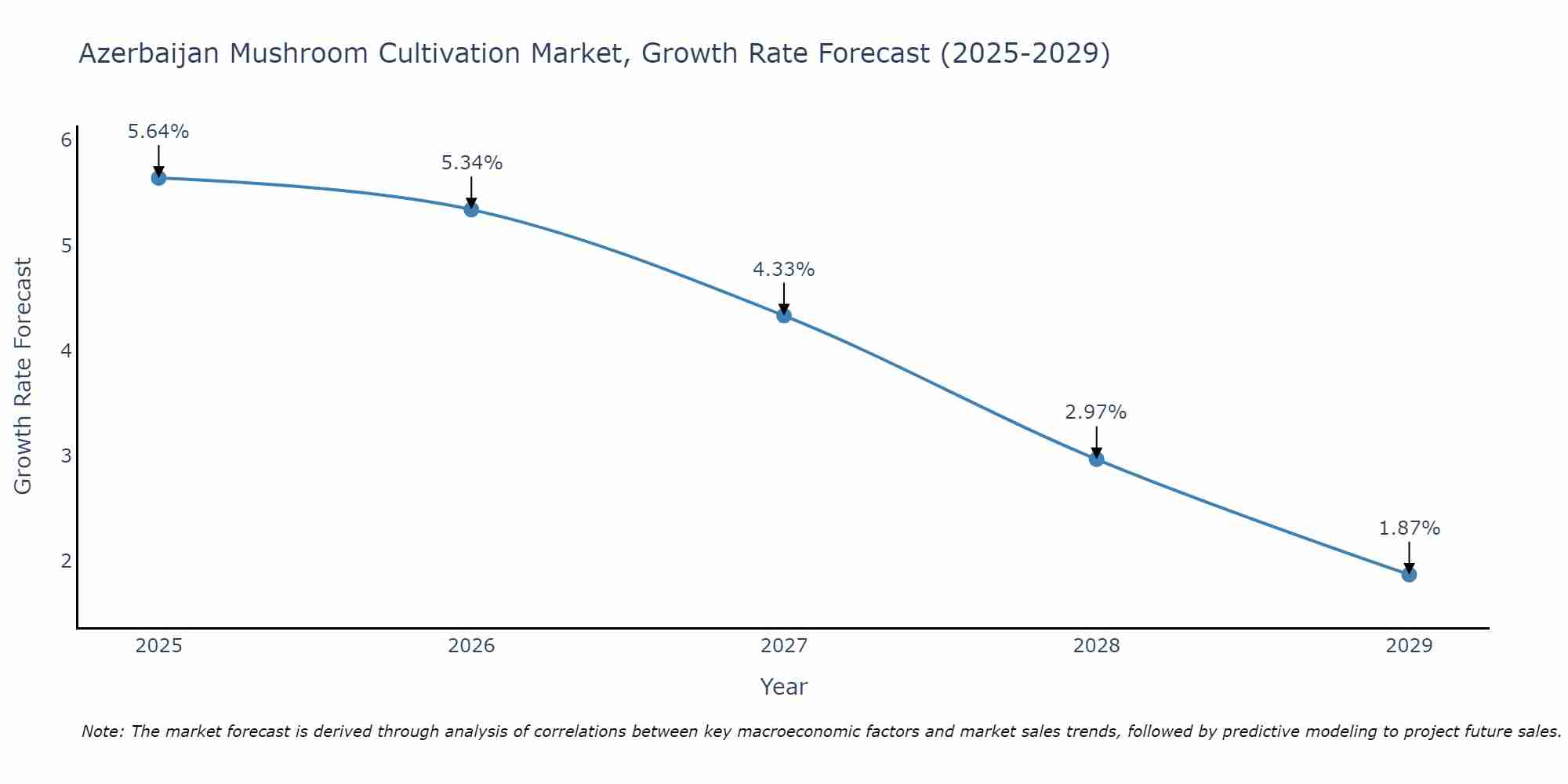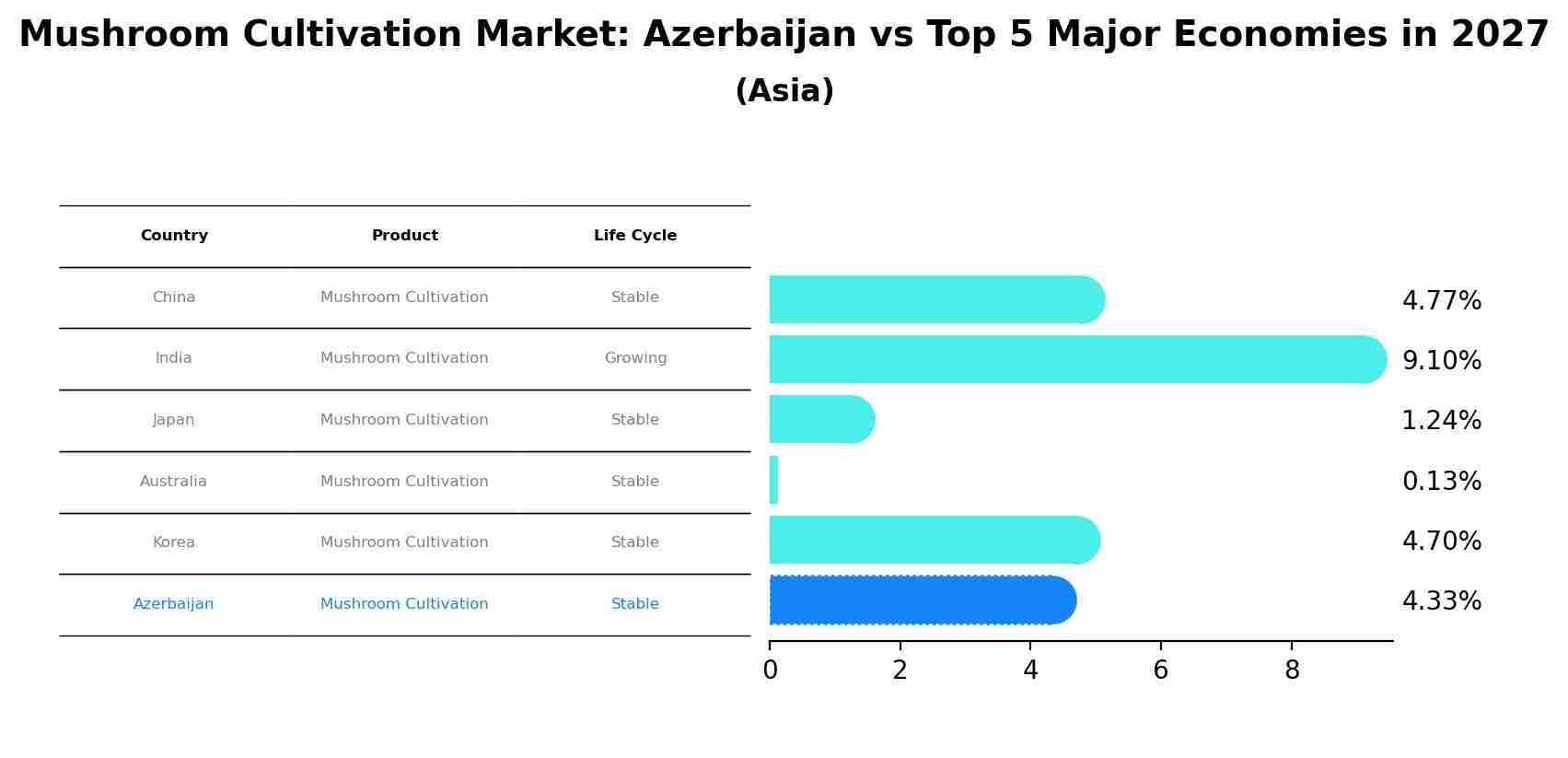Azerbaijan Mushroom Cultivation Market (2025-2031) Outlook | Analysis, Size, Revenue, Trends, Growth, Industry, Value, Forecast, Share & Companies
| Product Code: ETC383157 | Publication Date: Aug 2022 | Updated Date: Apr 2025 | Product Type: Market Research Report | |
| Publisher: 6Wresearch | Author: Shubham Padhi | No. of Pages: 75 | No. of Figures: 35 | No. of Tables: 20 |
Azerbaijan Mushroom Cultivation Market Size Growth Rate
The Azerbaijan Mushroom Cultivation Market may undergo a gradual slowdown in growth rates between 2025 and 2029. Starting high at 5.64% in 2025, the market steadily declines to 1.87% by 2029.

Mushroom Cultivation Market: Azerbaijan vs Top 5 Major Economies in 2027 (Asia)
The Mushroom Cultivation market in Azerbaijan is projected to grow at a stable growth rate of 4.33% by 2027, highlighting the country's increasing focus on advanced technologies within the Asia region, where China holds the dominant position, followed closely by India, Japan, Australia and South Korea, shaping overall regional demand.

Azerbaijan Mushroom Cultivation Market Synopsis
The mushroom cultivation market in Azerbaijan serves the food and agriculture sector by producing mushrooms for domestic consumption and export. Mushroom cultivation, including varieties such as button mushrooms, oyster mushrooms, and shiitake mushrooms, offers opportunities for small-scale farmers and commercial growers to meet the demand for fresh and processed mushrooms in Azerbaijan market.
Drivers of the market
The mushroom cultivation market in Azerbaijan is driven by the increasing demand for nutritious and organic mushrooms in the food industry, healthcare sector, and culinary applications. Mushroom cultivation involves growing various mushroom species such as button mushrooms, oyster mushrooms, and shiitake mushrooms using substrate materials in controlled environments. Factors such as health awareness, dietary preferences, and sustainable farming practices drive the growth of the mushroom cultivation market in Azerbaijan.
Challenges of the market
The Azerbaijan mushroom cultivation market faces challenges despite the potential of mushrooms as nutritious, sustainable, and high-value crops. One significant hurdle is the limited infrastructure and technical expertise in mushroom cultivation and production in Azerbaijan. Investing in training programs, research facilities, and partnerships with international experts is crucial for advancing mushroom cultivation practices and increasing production capacity in the country. Moreover, concerns about market access and distribution pose challenges for mushroom growers in Azerbaijan. Establishing reliable supply chains, distribution networks, and marketing channels for fresh and processed mushrooms is essential for reaching consumers and maximizing market opportunities. Additionally, economic constraints and access to inputs may impact investment in mushroom cultivation in Azerbaijan. Convincing farmers of the economic benefits and profitability of growing mushrooms as an alternative or supplementary crop requires comprehensive analysis and advocacy efforts.
Government Policy of the market
In efforts to promote agricultural diversification and food security, the Azerbaijan government has introduced policies to support the mushroom cultivation market. These policies include training programs for farmers on mushroom cultivation techniques, subsidies for setting up mushroom farms, and initiatives to develop sustainable cultivation practices. These policies collectively reflect the Azerbaijan government`s commitment to fostering growth, innovation, and sustainability across various sectors of the economy.
Key Highlights of the Report:
- Azerbaijan Mushroom Cultivation Market Outlook
- Market Size of Azerbaijan Mushroom Cultivation Market, 2024
- Forecast of Azerbaijan Mushroom Cultivation Market, 2031
- Historical Data and Forecast of Azerbaijan Mushroom Cultivation Revenues & Volume for the Period 2021-2031
- Azerbaijan Mushroom Cultivation Market Trend Evolution
- Azerbaijan Mushroom Cultivation Market Drivers and Challenges
- Azerbaijan Mushroom Cultivation Price Trends
- Azerbaijan Mushroom Cultivation Porter's Five Forces
- Azerbaijan Mushroom Cultivation Industry Life Cycle
- Historical Data and Forecast of Azerbaijan Mushroom Cultivation Market Revenues & Volume By Type for the Period 2021-2031
- Historical Data and Forecast of Azerbaijan Mushroom Cultivation Market Revenues & Volume By Button Mushroom for the Period 2021-2031
- Historical Data and Forecast of Azerbaijan Mushroom Cultivation Market Revenues & Volume By Oyster Mushroom for the Period 2021-2031
- Historical Data and Forecast of Azerbaijan Mushroom Cultivation Market Revenues & Volume By Shiitake Mushroom for the Period 2021-2031
- Historical Data and Forecast of Azerbaijan Mushroom Cultivation Market Revenues & Volume By Others for the Period 2021-2031
- Azerbaijan Mushroom Cultivation Import Export Trade Statistics
- Market Opportunity Assessment By Type
- Azerbaijan Mushroom Cultivation Top Companies Market Share
- Azerbaijan Mushroom Cultivation Competitive Benchmarking By Technical and Operational Parameters
- Azerbaijan Mushroom Cultivation Company Profiles
- Azerbaijan Mushroom Cultivation Key Strategic Recommendations
Frequently Asked Questions About the Market Study (FAQs):
- Single User License$ 1,995
- Department License$ 2,400
- Site License$ 3,120
- Global License$ 3,795
Search
Thought Leadership and Analyst Meet
Our Clients
Related Reports
- Canada Oil and Gas Market (2026-2032) | Share, Segmentation, Value, Industry, Trends, Forecast, Analysis, Size & Revenue, Growth, Competitive Landscape, Outlook, Companies
- Germany Breakfast Food Market (2026-2032) | Industry, Share, Growth, Size, Companies, Value, Analysis, Revenue, Trends, Forecast & Outlook
- Australia Briquette Market (2025-2031) | Growth, Size, Revenue, Forecast, Analysis, Trends, Value, Share, Industry & Companies
- Vietnam System Integrator Market (2025-2031) | Size, Companies, Analysis, Industry, Value, Forecast, Growth, Trends, Revenue & Share
- ASEAN and Thailand Brain Health Supplements Market (2025-2031) | Strategy, Consumer Insights, Analysis, Investment Trends, Opportunities, Growth, Size, Share, Industry, Revenue, Segments, Value, Segmentation, Supply, Forecast, Restraints, Outlook, Competition, Drivers, Trends, Demand, Pricing Analysis, Competitive, Strategic Insights, Companies, Challenges
- ASEAN Bearings Market (2025-2031) | Strategy, Consumer Insights, Analysis, Investment Trends, Opportunities, Growth, Size, Share, Industry, Revenue, Segments, Value, Segmentation, Supply, Forecast, Restraints, Outlook, Competition, Drivers, Trends, Demand, Pricing Analysis, Competitive, Strategic Insights, Companies, Challenges
- Europe Flooring Market (2025-2031) | Outlook, Share, Industry, Trends, Forecast, Companies, Revenue, Size, Analysis, Growth & Value
- Saudi Arabia Manlift Market (2025-2031) | Outlook, Size, Growth, Trends, Companies, Industry, Revenue, Value, Share, Forecast & Analysis
- Uganda Excavator, Crane, and Wheel Loaders Market (2025-2031) | Strategy, Consumer Insights, Analysis, Investment Trends, Opportunities, Growth, Size, Share, Industry, Revenue, Segments, Value, Segmentation, Supply, Forecast, Restraints, Outlook, Competition, Drivers, Trends, Demand, Pricing Analysis, Competitive, Strategic Insights, Companies, Challenges
- Rwanda Excavator, Crane, and Wheel Loaders Market (2025-2031) | Strategy, Consumer Insights, Analysis, Investment Trends, Opportunities, Growth, Size, Share, Industry, Revenue, Segments, Value, Segmentation, Supply, Forecast, Restraints, Outlook, Competition, Drivers, Trends, Demand, Pricing Analysis, Competitive, Strategic Insights, Companies, Challenges
Industry Events and Analyst Meet
Whitepaper
- Middle East & Africa Commercial Security Market Click here to view more.
- Middle East & Africa Fire Safety Systems & Equipment Market Click here to view more.
- GCC Drone Market Click here to view more.
- Middle East Lighting Fixture Market Click here to view more.
- GCC Physical & Perimeter Security Market Click here to view more.
6WResearch In News
- Doha a strategic location for EV manufacturing hub: IPA Qatar
- Demand for luxury TVs surging in the GCC, says Samsung
- Empowering Growth: The Thriving Journey of Bangladesh’s Cable Industry
- Demand for luxury TVs surging in the GCC, says Samsung
- Video call with a traditional healer? Once unthinkable, it’s now common in South Africa
- Intelligent Buildings To Smooth GCC’s Path To Net Zero


















